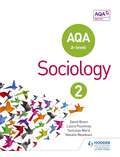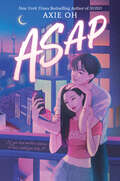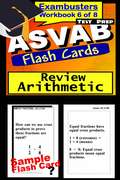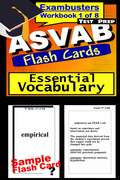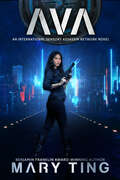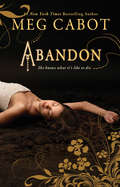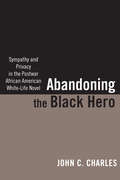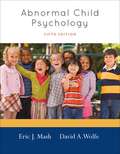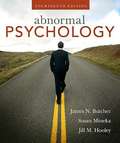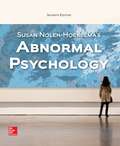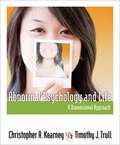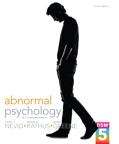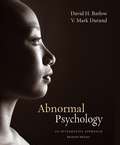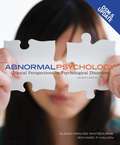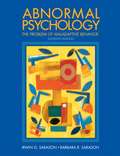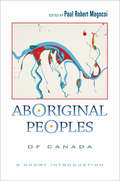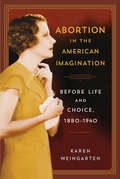- Table View
- List View
AQA Sociology for A-level Book 2
by David Bown Laura Pountney Tomislav Maric Natalie MeadowsExam Board: AQALevel: AS/A-levelSubject: SociologyFirst Teaching: September 2016First Exam: June 2017Build students' understanding with this concept-driven approach to the 2015 AQA A-level Sociology specification, written by a team of leading subject authors and approved by AQA.- Develop the knowledge required to master Year 2 topics with clear and accessible content coverage- Build confidence in the evaluative skills needed to assess sociological theories and research- Strengthen learning and revision with a wealth of practice and extension questions and activities
ASAP (An XOXO Novel)
by Axie OhNew York Times bestselling author Axie Oh's ASAP is the much anticipated companion novel to beloved romance XOXO, following fan favorites Sori, the wealthy daughter of a K-pop company owner, and Nathaniel, her K-pop star ex-boyfriend, in a swoon-worthy second chance love story.Sori has worked her whole life to become a K-pop idol, until she realizes she doesn’t want a life forever in the spotlight. But that’s not actually up to Sori—she’s caught between her exacting mother’s entertainment company and her father’s presidential aspirations. And as the pressure to keep her flawless public image grows, the last person she should be thinking about is her ex-boyfriend.Nathaniel is off limits—she knows this. A member of one of the biggest K-pop bands in the world and forbidden from dating, he isn’t any more of an option now than he was two years ago. Still, she can’t forget that their whirlwind romance was the last time she remembers being really happy. Or that his family welcomed her into their home when she needed it most. . . .So when Nathaniel finds himself rocked by scandal, Sori offers him a hideaway with her. And back in close quarters, it’s hard to deny their old feelings. But when Sori gets an opportunity to break free from her parent’s expectations, she will have to decide: Is her future worth sacrificing for a second chance at love?
ASVAB Test Prep Flash Cards: Algebra (Exambusters ASVAB Workbook #7 of 8)
by Ace Inc.<P><P><i>Advisory: Bookshare has learned that this book offers only partial accessibility. We have kept it in the collection because it is useful for some of our members. Benetech is actively working on projects to improve accessibility issues such as these.</i><P><P> "ASVAB Prep Flashcard Workbook 7: ALGEBRA REVIEW" 450 questions and answers that highlight introductory algebra definitions, problems, and concepts. Topics: Algebraic Concepts, Sets, Variables, Exponents, Properties of Numbers, Simple Equations, Signed Numbers, Monomials, Polynomials, Additive and Multiplicative Inverse, Word Problems, Prime Numbers, Factoring, Algebraic Fractions, Ratio and Proportion, Variation, Radicals, Quadratic Equations <P>EXAMBUSTERS ASVAB Prep Workbooks provide comprehensive, fundamental ASVAB review--one fact at a time--to prepare students to take practice ASVAB tests. Each ASVAB study guide focuses on one specific subject area covered on the ASVAB exam. From 300 to 600 questions and answers, each volume in the ASVAB series is a quick and easy, focused read. Reviewing ASVAB flash cards is the first step toward more confident ASVAB preparation and ultimately, higher ASVAB exam scores!
ASVAB Test Prep Flash Cards: Arithmetic (Exambusters ASVAB Workbook #6 of 8)
by Ace Inc.<P><P><i>Advisory: Bookshare has learned that this book offers only partial accessibility. We have kept it in the collection because it is useful for some of our members. Benetech is actively working on projects to improve accessibility issues such as these.</i><P><P> "ASVAB Prep Flashcard Workbook 6: ARITHMETIC REVIEW" 600 questions and answers highlight essential arithmetic definitions, problems, and concepts. Topics: Addition, Subtraction, Multiplication, and Division of Whole Numbers; Fractions and Decimals, Multiplication Tables, Word Problems, Percents, Measurement, Metric System, Square Roots and Powers, Real Numbers, Properties of Numbers <P>EXAMBUSTERS ASVAB Prep Workbooks provide comprehensive, fundamental ASVAB review--one fact at a time--to prepare students to take practice ASVAB tests. Each ASVAB study guide focuses on one specific subject area covered on the ASVAB exam. From 300 to 600 questions and answers, each volume in the ASVAB series is a quick and easy, focused read. Reviewing ASVAB flash cards is the first step toward more confident ASVAB preparation and ultimately, higher ASVAB exam scores!
ASVAB Test Prep Flash Cards: Biology (Exambusters ASVAB Workbook #3 of 8)
by Ace Inc.<P><P><i>Advisory: Bookshare has learned that this book offers only partial accessibility. We have kept it in the collection because it is useful for some of our members. Benetech is actively working on projects to improve accessibility issues such as these.</i><P><P> 450 questions and answers.<P><P> Topics: Cells, Biochemistry and Energy, Evolution, Kingdoms: Monera, Fungi, Protista, Plants, Animals; Human: Locomotion, Circulation, Immunology, Respiration, Excretion, Digestion, Nervous System <P>EXAMBUSTERS ASVAB Prep Workbooks provide comprehensive, fundamental ASVAB review--one fact at a time--to prepare students to take practice ASVAB tests. Each ASVAB study guide focuses on one specific subject area covered on the ASVAB exam. From 300 to 600 questions and answers, each volume in the ASVAB series is a quick and easy, focused read. Reviewing ASVAB flash cards is the first step toward more confident ASVAB preparation and ultimately, higher ASVAB exam scores!
ASVAB Test Prep Flash Cards: Chemistry (Exambusters ASVAB Workbook #4 of 8)
by Ace Inc.<P><P><i>Advisory: Bookshare has learned that this book offers only partial accessibility. We have kept it in the collection because it is useful for some of our members. Benetech is actively working on projects to improve accessibility issues such as these.</i><P><P> 700 questions and answers. Essential chemistry formulas and concepts you need.<P><P> Topics: Metric System, Matter, Atoms, Formulas, Moles, Reactions, Elements, Chemical Bonds, Phase Changes, Solutions, Reaction Rates, Acids and Bases, Oxidation and Reduction, Introduction to Organic Chemistry<P> <P>EXAMBUSTERS ASVAB Prep Workbooks provide comprehensive, fundamental ASVAB review--one fact at a time--to prepare students to take practice ASVAB tests. Each ASVAB study guide focuses on one specific subject area covered on the ASVAB exam. From 300 to 600 questions and answers, each volume in the ASVAB series is a quick and easy, focused read. Reviewing ASVAB flash cards is the first step toward more confident ASVAB preparation and ultimately, higher ASVAB exam scores!
ASVAB Test Prep Flash Cards: Earth Science (Exambusters ASVAB Workbook #2 of 8)
by Ace Inc.<P><P><i>Advisory: Bookshare has learned that this book offers only partial accessibility. We have kept it in the collection because it is useful for some of our members. Benetech is actively working on projects to improve accessibility issues such as these.</i><P><P> 600 questions and answers. Essential earth science and geology facts. <P><P>Topics: Earth's Origin, Minerals, Rocks, Weathering, Wind and Glaciers, Oceans, Maps, Atmosphere, Astronomy <P>EXAMBUSTERS ASVAB Prep Workbooks provide comprehensive, fundamental ASVAB review--one fact at a time--to prepare students to take practice ASVAB tests. Each ASVAB study guide focuses on one specific subject area covered on the ASVAB exam. From 300 to 600 questions and answers, each volume in the ASVAB series is a quick and easy, focused read. Reviewing ASVAB flash cards is the first step toward more confident ASVAB preparation and ultimately, higher ASVAB exam scores!
ASVAB Test Prep Flash Cards: Essential Vocabulary (Exambusters ASVAB Workbook #1 of 8)
by Ace Inc.<P><P><i>Advisory: Bookshare has learned that this book offers only partial accessibility. We have kept it in the collection because it is useful for some of our members. Benetech is actively working on projects to improve accessibility issues such as these.</i><P><P> 500 frequently tested ASVAB words every high school student should know. Perfect for anyone who wants to enrich their vocabulary! Improve your reading comprehension and conversation. <P><P>Includes sample sentence, part of speech, pronunciation, succinct, easy-to-remember definition, and common synonyms and antonyms. <P>EXAMBUSTERS ASVAB Prep Workbooks provide comprehensive, fundamental ASVAB review--one fact at a time--to prepare students to take practice ASVAB tests. Each ASVAB study guide focuses on one specific subject area covered on the ASVAB exam. From 300 to 600 questions and answers, each volume in the ASVAB series is a quick and easy, focused read. Reviewing ASVAB flash cards is the first step toward more confident ASVAB preparation and ultimately, higher ASVAB exam scores!
ASVAB Test Prep Flash Cards: Geometry (Exambusters ASVAB Workbook #8 of 8)
by Ace Inc.<P><P><i>Advisory: Bookshare has learned that this book offers only partial accessibility. We have kept it in the collection because it is useful for some of our members. Benetech is actively working on projects to improve accessibility issues such as these.</i><P><P> "ASVAB Prep Flashcard Workbook 8: GEOMETRY" 450 questions and answers (ILLUSTRATED) that focus on essential geometry theorems, postulates, concepts, and definitions. Includes complementary diagrams. Topics: Lines and Angles, Triangles, Proofs, Perpendicular Lines, Parallel Lines, Angle Sums, Quadrilaterals, Medians, Altitudes and Bisectors, Circles, Ratio and Proportion, Similar Polygons, Circles and Regular Polygons, Coordinate Geometry <P>EXAMBUSTERS ASVAB Prep Workbooks provide comprehensive, fundamental ASVAB review--one fact at a time--to prepare students to take practice ASVAB tests. Each ASVAB study guide focuses on one specific subject area covered on the ASVAB exam. From 300 to 600 questions and answers, each volume in the ASVAB series is a quick and easy, focused read. Reviewing ASVAB flash cards is the first step toward more confident ASVAB preparation and ultimately, higher ASVAB exam scores!
ASVAB Test Prep Flash Cards: Physics (Exambusters ASVAB Workbook #5 of 8)
by Ace Inc.<P><P><i>Advisory: Bookshare has learned that this book offers only partial accessibility. We have kept it in the collection because it is useful for some of our members. Benetech is actively working on projects to improve accessibility issues such as these.</i><P><P> 600 questions and answers. Sample problems. <P><P>Topics: Metric System, Motion and Forces, Work and Energy, Fluids, Sound, Light and Optics, Static Electricity, D.C. and A.C. Circuits, Magnetism <P>EXAMBUSTERS ASVAB Prep Workbooks provide comprehensive, fundamental ASVAB review--one fact at a time--to prepare students to take practice ASVAB tests. Each ASVAB study guide focuses on one specific subject area covered on the ASVAB exam. From 300 to 600 questions and answers, each volume in the ASVAB series is a quick and easy, focused read. Reviewing ASVAB flash cards is the first step toward more confident ASVAB preparation and ultimately, higher ASVAB exam scores!
AVA (International Sensory Assassin Network #5)
by Mary TingThe final installment of the Multi-Award-Winning series.The days of hiding are over. The battle for supremacy is here. The fate of the rebels is at hand. Ava heads to South Korea to bring down the facility that manufactures the CODE army. But she can't do it alone. She'll have to trust fellow conspirators and put her life on the line. When the South rebel leader searches for missing team members, she's captured and taken to the Korean ISAN base. There, she discovers a secret that could change the course of the war in their favor. After the rebel mountain base is threatened, Ava has no choice but to comply with Korean ISAN demands—or end up killing everyone she loves.
Abandon (Abandon #1)
by Meg CabotFrom #1 New York Times bestselling author Meg Cabot, a dark, fantastical story about this world . . . and the underworld.Pierce knows what it's like to die, because she's done it before. Though she tries returning to the life she knew before the accident, Pierce can't help but feel at once a part of this world, and apart from it. Yet she's never alone . . . because someone is always watching her.Now she's moved to a new town, but even here, he finds her. Pierce knows he's no guardian angel, and his dark world isn't exactly heaven, yet she can't stay away . . . especially since he always appears when she least expects it, but exactly when she needs him most. If she lets herself fall any further, she may just find herself back in the one place she most fears: the Underworld.
Abandoning the Black Hero: Sympathy and Privacy in the Postwar African American White-Life Novel
by John C. CharlesAbandoning the Black Hero is the first book to examine the postwar African American white-life novel--novels with white protagonists written by African Americans. These fascinating works have been understudied despite having been written by such defining figures in the tradition as Richard Wright, Zora Neale Hurston, James Baldwin, Ann Petry, and Chester Himes, as well as lesser known but formerly best-selling authors Willard Motley and Frank Yerby.John C. Charles argues that these fictions have been overlooked because they deviate from two critical suppositions: that black literature is always about black life and that when it represents whiteness, it must attack white supremacy. The authors are, however, quite sympathetic in the treatment of their white protagonists, which Charles contends should be read not as a failure of racial pride but instead as a strategy for claiming creative freedom, expansive moral authority, and critical agency.In an era when "Negro writers" were expected to protest, their sympathetic treatment of white suffering grants these authors a degree of racial privacy previously unavailable to them. White writers, after all, have the privilege of racial privacy because they are never pressured to write only about white life. Charles reveals that the freedom to abandon the "Negro problem" encouraged these authors to explore a range of new genres and themes, generating a strikingly diverse body of novels that significantly revise our understanding of mid-twentieth-century black writing.
Abdominal Imaging (Learning Imaging Ser.)
by Pablo R. Ros Bernd HammIn this book a team of leading experts come together to provide a comprehensive overview of modern imaging of the abdomen and pelvis, with detailed sections on both gastrointestinal and genitourinary imaging. Each chapter has an identical structure and focuses on a particular organ or organ system, allowing the reader to approach the field one topic at a time. Indications for a variety of imaging techniques and examination protocols are clearly described, and the imaging features of normal anatomy and pathologic entities are depicted in an abundance of high-quality images. Care is taken to consider all recent technical developments and new indications, and the diagnostic performance of different imaging modalities is carefully compared. It is anticipated that this book will come to be regarded as the standard work of reference on abdominal and pelvic radiology.
Abnormal Child Psychology (Fifth Edition)
by David A. Wolfe Eric J. MashThis book's thoughtful and accurate balance of developmental, clinical-diagnostic, and experimental approaches to child and adolescent psychopathology is accessible to a broad range of readers. Up-to-date and forward-looking, the book continues to provide the most authoritative, scholarly, and comprehensive coverage of these subjects, tracing the developmental course of each disorder and showing how biological, psychological, and sociocultural factors interact with a child's environment. Coverage includes the DSM-IV-TR and dimensional approaches to classification as well as evidence-based assessment and treatment, contemporary research, and the latest theories related to the predominantly inattentive ADHD subtype, early-onset and the developmental propensity model of conduct disorder, the triple vulnerability model of anxiety, the tripartite model in children, depression, and autism.
Abnormal Psychology (14th edition)
by James N. Butcher Susan Mineka Jill M. HooleyThis distinguished book is considered the most comprehensive in its field, and the author team includes the most preeminent and respected researchers in abnormal psychology today. The new 14th edition introduces a striking new design, new topics, fresh insights, streamlined writing, and a sharper focus on research in psychopathology.
Abnormal Psychology (7th Edition)
by Susan Nolen-Hoeksema Brett MarroquinThe seventh edition of Susan Nolen-Hoeksema's Abnormal Psychology continues her mission to create a program that blends the most contemporary research on psychological disorders with compassion for those who live with these disorders.
Abnormal Psychology and Life: A Dimensional Approach
by Christopher A. Kearney Timothy J. TrullChris Kearney and Tim Trull's ABNORMAL PSYCHOLOGY AND LIFE: A DIMENSIONAL APPROACH provides students with a concise, contemporary, science-based view of psychopathology that emphasizes the individual first and the disorder second. Through consistent pedagogy featuring clinical cases and real first-person narratives, the text illuminates our understanding that abnormal behavior--rather than being either present or absent--exists in everyone to some degree on a continuum from normal to pathological. By highlighting this widely accepted dimensional view--which places the behavior of an individual at the forefront of clinical assessment, prevention, definition, and treatment--the text's goal is to encourage students to become intelligent consumers of mental health information. With its emphasis on assessment and treatment as well as prevention, the book gives students the tools necessary to understand the precursors of abnormal behavior, overcome the stigma associated with it, and identify the real people classified as exhibiting it.
Abnormal Psychology in a Changing World
by Jeffrey S. Nevid Spence A. Rathus Beverly S. GreeneAbnormal Psychology in a Changing World, 9/e uses first-person narratives from people struggling with psychological disorders as a pedagogical framework. Updated to reflect the revision of the Diagnostic and Statistical Manual (DSM-5), the authors endeavor to bring research developments and advancements in abnormal psychology to students. Through illustrative case examples drawn from the authors' own experiences, they recognize there is a human dimension to the study of abnormal psychology.
Abnormal Psychology: An Integrative Approach (Seventh Edition)
by David H. Barlow V. Mark DurandBalancing biological, psychological, social, and cultural approaches, David Barlow and V. Mark Durand's groundbreaking integrative approach is the most modern, scientifically valid method for studying abnormal psychology. In this Seventh Edition of their proven ABNORMAL PSYCHOLOGY: AN INTEGRATIVE APPROACH, Barlow and Durand successfully blend sophisticated research and an accessible writing style with the most widely recognized method of discussing psychopathology. Going beyond simply describing different schools of thought on psychological disorders, the authors explore the interactions of the various forces that contribute to psychopathology. A conversational writing style, consistent pedagogical elements, integrated case studies (95 percent from the authors' own files), video clips of clients, and additional study tools make this text the most complete learning resource available.
Abnormal Psychology: Clinical Perspectives on Psychological Disorders with DSM-5 Update
by Susan Krauss Whitbourne Richard HalginIn Susan Krauss Whitbourne and Richard Halgin's "Abnormal Psychology: Clinical Perspectives on Psychological Disorders," students are shown the human side of Abnormal Psychology. Through the widespread use of current and relevant clinical case studies, and the biographies and first-person quotations in the Real Stories feature, students are presented with real-life portrayals of the disorders featured in the text. The text maintains the integrative approach to treatment using the biopsychosocial model, and acknowledges the evolution of psychological disorders over the lifespan.
Abnormal Psychology: Clinical and Scientific Perspectives 5th Edition
by Charles A. Lyons Barclay MartinThis book intends to be a useful, reference resource that could serve as a primary text for students in undergraduate abnormal psychology courses and helps readers to understand the DSM-5 and to recognize the variety of treatments available.
Abnormal Psychology: The Problem of Maladaptive Behavior (11th edition)
by Irwin G. Sarason Barbara R. SarasonThis classic textbook builds on the strengths of existing theoretical systems and clinical methods to provide students with a comprehensive and up-to-date real-world overview of the field of abnormal psychology. It focuses on maladaptive behavior as a product of the interaction between personal vulnerabilities and resiliencies.
Aboriginal Peoples of Canada
by Paul Robert MagocsiCanada's Aboriginal Peoples: A Short Introduction fills a previously overlooked gap by providing the first comprehensive overview of Canada's First Nations people. Drawn from the highly successful Encyclopedia of Canada's Peoples it offers extensive coverage of Canada's aboriginal peoples, including the Algonquians/Eastern Woodlands, Algonquians/Plains, Algonquians/Subarctic, Inuit, Iroquoians, Ktunaxa, Metis, Na-Dene, Salish, Siouan, Tsimshian, and Wakashans, as well as the many nations within these larger groupings.With a new preface by Paul Robert Magocsi and an introduction by well-known historian Jim Miller, the collection has papers on each main group written by such scholars as Janet Chute, Olive Dickason, Louis-Jacques Dorais, and Eldon Yellowhorn. Each essay covers economics, culture, language, education, politics, kinship, religion, social organization, identification, and history of each nation, among other topics, and ends with suggestions for further readings. Readable and suitable for the student, casual reader or expert, the book is an excellent introduction to Canada's aboriginal peoples.
Abortion in the American Imagination
by Karen WeingartenThe public debate on abortion stretches back much further than Roe v. Wade, to long before the terms "pro-choice" and "pro-life" were ever invented. Yet the ways Americans discussed abortion in the early decades of the twentieth century had little in common with our now-entrenched debates about personal responsibility and individual autonomy. Abortion in the American Imagination returns to the moment when American writers first dared to broach the controversial subject of abortion. What was once a topic avoided by polite society, only discussed in vague euphemisms behind closed doors, suddenly became open to vigorous public debate as it was represented everywhere from sensationalistic melodramas to treatises on social reform. Literary scholar and cultural historian Karen Weingarten shows how these discussions were remarkably fluid and far-ranging, touching upon issues of eugenics, economics, race, and gender roles. Weingarten traces the discourses on abortion across a wide array of media, putting fiction by canonical writers like William Faulkner, Edith Wharton, and Langston Hughes into conversation with the era's films, newspaper articles, and activist rhetoric. By doing so, she exposes not only the ways that public perceptions of abortion changed over the course of the twentieth century, but also the ways in which these abortion debates shaped our very sense of what it means to be an American.
